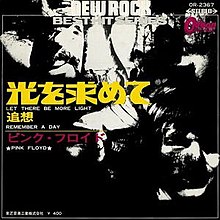Let There Be More Light
| "Let There Be More Light" | ||||
|---|---|---|---|---|
 |
||||
| Single by Pink Floyd | ||||
| from the album A Saucerful of Secrets | ||||
| B-side | "Remember a Day" | |||
| Released | 19 August 1968 | |||
| Format | 7" | |||
| Recorded | January-May 1968 at EMI Studios, London | |||
| Genre | Hard rock | |||
| Length | 5:32 | |||
| Label | Tower (US) | |||
| Songwriter(s) | Roger Waters | |||
| Producer(s) | Norman Smith | |||
| Pink Floyd singles chronology | ||||
|
||||
"Let There Be More Light" is the opening track on Pink Floyd's second album A Saucerful of Secrets. It was also released in edited form as the fourth American single by the group.
The song is written by Roger Waters. It begins with an iterative bass line before the vocals start. The first, gentler vocals are performed by Rick Wright with Waters whispering, and the following, harder refrain is sung by David Gilmour. The last two minutes of the song mark the first appearance of a guitar solo by Gilmour on a Pink Floyd album.
"Let There Be More Light" describes the imagined descent of a fantastical spacecraft at RAF Mildenhall, north-east of Waters' hometown of Cambridge. From 1950, RAF Mildenhall primarily supported US Air Force operations, including the Strategic Air Command.
The song shares the theme of benevolent extraterrestrial intervention in human affairs with the 1951 film The Day the Earth Stood Still and Arthur C. Clarke's 1953 novel Childhood's End. Along with "Set the Controls for the Heart of the Sun" and 1969's "Cirrus Minor", it is one of only three Waters-penned lyrics to feature science fiction themes prior to his 1992 solo album Amused to Death.
"Let There Be More Light" includes cryptic references to science fiction stories, the 11th century rebel Hereward the Wake, The Beatles' song "Lucy in the Sky with Diamonds" and one of Pink Floyd's early light show operators. While the oblique lyrics contrast with the more direct style that Waters would later adopt, the historical and popular culture references tentatively pre-figure the overt political sentiments of later Pink Floyd and Waters solo releases.
...
Wikipedia
